- About Us
- Columns
- Letters
- Cartoons
- The Udder Limits
- Archives
- Ezy Reading Archive
- 2024 Cud Archives
- 2023 Cud Archives
- 2022 Cud Archives
- 2021 Cud Archives
- 2020 Cud Archives
- 2015-2019
- 2010-2014
- 2004-2009
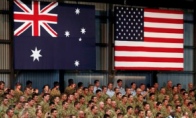 |
December 2011 - All I Want For Christmas Is An End To Militarisation |
Most people in western countries and perhaps worldwide would probably like to spend their energies in December preparing to enter the spirit of Christmas. People of goodwill everywhere are refreshed by family reunion, the exchange of gifts and simple well-wishing. Unfortunately, the poverty that depresses some families and individuals is exacerbated by the emphasis on commercialism and many families are saddened by the estrangement of some members or by tragedies. Natural disasters such as floods and fires have a nasty habit – perhaps increasing with climate change - of spoiling the season. Perhaps such problems are inevitable, but the actions of governments and their political opponents are not.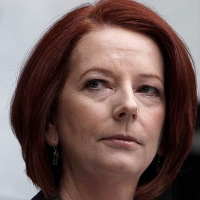 Outrages such as assassinations, terrorist bombings, arbitrary arrests and wars appear even nastier when contrasted to the innocence in the faces of children anticipating Christmas morning.
Outrages such as assassinations, terrorist bombings, arbitrary arrests and wars appear even nastier when contrasted to the innocence in the faces of children anticipating Christmas morning.
Before we in Australia congratulate ourselves on the relatively secure and prosperous time of Christmas 2011, it would be well to contemplate the smiles of those children who represent the future. There are serious reasons to question whether the world we are preparing for them will be as happy as it should. When you become a grandparent it is customary to reflect on your inheritance and my generation should not feel entirely comfortable.
Many Australian baby-boomers would have been relieved to see a change of government in 2007. After a decade of Coalition rule the political culture had swung too far towards individualism, competitiveness, subjection of social needs to market forces, disdain for the environment, a view of the external world as hostile and of ourselves as an elite. The optimism accompanying Labor’s election peaked with the apology to the Stolen Generations of Indigenous People but disillusionment has followed. Despite the self-congratulations at Labor’s national conference this month on issues such as marriage equality, the Government has reversed too few of its predecessor’s policies. It has continued the ‘intervention’ into the lives of Northern Territory Aborigines, continued to generate paranoia about asylum seekers and has adopted a very cautious approach to climate change in a time when radical action is needed.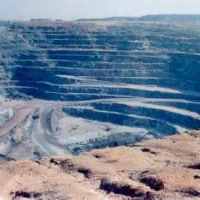
Significantly, while the Labor conference engaged in some debate before deciding to export uranium to India, it seems to have ignored the Government’s announcement that it would allow a foreign military power to operate a base in the ‘Top End’. Uranium mining and export threatened to tear the party apart at the 1984 election in the context of the Cold War and the nuclear arms race. While the East-West Cold War is over, the perception that nuclear war is no longer a threat is unfortunate. Indeed, nuclear proliferation is very much an issue, with the old arsenals of America and Russia deteriorating physically and sometimes in unstable political control. The failure of the old superpowers to provide serious leadership on the issue has encouraged emerging powers to consider nuclear armament to be their right. While India might seem to be friendly and might claim to need uranium only for power generation, the West is less keen on the nuclear aspirations of Pakistan and especially Iran and North Korea. In this context, the announcement that the USA would be basing war machines in the North of Australia seems like a pre-emptive placement which admits failure in arms control.
The decision to export more uranium is a reminder of just how dependent we have become on mining. Sadly, too few economists are drawing attention to the likely long-term consequences of this imbalance, the detrimental aspects of which have become known as the ‘Dutch disease’. In its turmoil over declining membership and loss of ideological heart, Labor is prepared to be politically expedient. During his term, Mr Howard was widely condemned for lacking a vision for Australia’s future. Labor’s notion of a vision seems limited to its ability to win the next election, and so it has become fixated on its fortune in opinion polls. 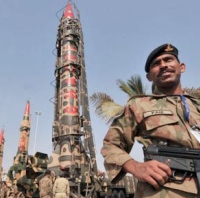
The invitation to US forces is no surprise because Australia is moving ever closer to becoming the regional US Deputy predicted in the early days of the War On Terror (WOT) during the Howard reign. The Gillard Government risks international isolation at the UN in its enthusiastic support for the USA’s Israel policy. Conspiracy theorists who noted the attendance of a Labor mover and shaker at American briefing sessions in Canberra will now revive suspicions that the USA may have had some influence in the removal of Kevin Rudd from the Labor leadership and the Prime Minister’s office.
Few Australians would understand the strategic reasons that the US wants to base weapons of mass destruction here. The Government expects that a general notion of mateship between the countries and an assumption that the base will somehow make Australia safer will generate widespread acceptance. There are parallels from the 1980s when the British Government accepted American Intermediate Range Nuclear Forces to threaten targets in the USSR. It will be interesting to see Helen Mirren’s portrayal of Margaret Thatcher in cinemas over the next few weeks. Thatcher was condemned by disarmament movement demonstrators such as the women of Greenham Common who ridiculed her relationship with US President Ronald Reagan. Prime Minister Gillard might assume that her relationship with President Obama is a source of popularity, but when opposition to the invitation is mobilised, she might well find herself having to play the role of Iron Lady, a role that carries great political dangers. While she created history by becoming Australia’s first female prime minister Ms Gillard should be mindful of how history will judge her tenure. 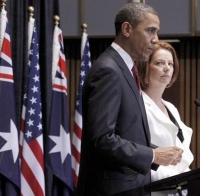
Prime Minister Gillard names Bob Hawke (Prime Minister 1983-91) as a role model. She must realise that the Hawke Government came under great pressure to do more for disarmament in the 1980s especially around the UN’s International Year of Peace in 1986. The peace movement of the time rejected arguments that nuclear deterrence made us more secure and campaigned for the removal of American bases and the denial of Australian ports to nuclear warships. Peace activists were accused of being pro-Soviet and of weakening the west, but the deployment anticipated by Ms Gillard’s recent announcement does not specify an imminent threat.
The deployment of American forces on Australian soil will have some supporters. Intelligence experts and strategic analysts might see the move as a strengthening of Australia’s position globally. Unfortunately, the manipulation of figures and maps has little to do with the flesh and blood experiences of people affected by militarisation. Arms manufacturers, described by Bob Dylan as ‘The masters of war’ will celebrate the announcement. They too have the knack of ignoring the human consequences of their trade, such as the enduring legacy of land mines and cluster bombs.
Arms manufacturers, described by Bob Dylan as ‘The masters of war’ will celebrate the announcement. They too have the knack of ignoring the human consequences of their trade, such as the enduring legacy of land mines and cluster bombs.
Militarisation always occurs at the expense of lost opportunities. It saps the store of goodwill between nations, hampers economic development and tempts us to believe that might is right in domestic as well as international affairs. Its philosophy of expediency tempts even the most democratic of states to accept that abuses such as those which occurred at Abu Ghraib and Guantanamo Bay and violations of sovereignty during ‘renditions’. Militarisation thrives on an egocentric arrogance that assumes that the outsider is suspect, greedy and aggressive. It abandons attempts at understanding and substitutes fear.
The Australian Government’s announcement that the USA is to increase its military presence here is regrettable. Militarisation will stimulate a new arms race in the region and create an atmosphere that will make the future less certain for future generations. As a grandparent, all I want for Christmas is an end to militarisation.
Tony Smith has written on defence and foreign policy issues in the Australian Quarterly, the Australian Review of Public Affairs, Eureka Street, Online Opinion and Unleashed.
